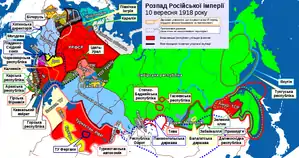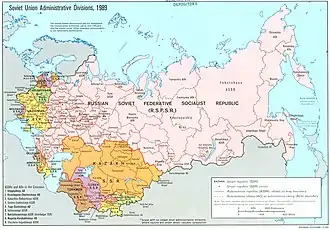Dissolution of Russia
The possible dissolution of Russia is a hypothetical disintegration of the current state of the Russia as a single state with a centralist government, as well as forecast, outlooks, opinions, analysis trajectories and implications of the subsequent consequences of this event.[1]
The topic is the subject of hundreds of articles on the Internet.[2]
The current Russian Federation as the primary remnant i.e. successor state of the Soviet Union after its collapse and dissolution has been experiencing disintegration processes of varying degrees threatening the collapse of the country. This topic was actively discussed by E. Kholmogorov, G. Kasparov, M. Leontiev, P. Svyatenkov, K. Remchukov, K. Rodionov, A. Eliseev, I. Prokopenko, G. Gref, M. Kalashnikov, M. Remizov, M. Delyagin, A. Fursov, G. Malinetsky, V. Solovey, S. Kurginyan, A. Prokhanov, N. Narochnitskaya, V. Averyanov, V. Tretyakov, I. Yakovenko, D. Medvedev.[1]
Historical precedents


Throughout the long turbulent and troublesome history of Russia and its various iterations of states and governments ranging from its imperial days as an absolutistic monarchy over the era of being a communist social republic during the soviet era there were two major periods during which significant large territories fell away from its control. The first is the disintegration of the Russian Empire as a result of the February and October revolutions in 1917–1921. Active disintegration processes began in the economy, social structure, public and political spheres of the Russian Empire, which ultimately led to the end of the Tsarist regime and became parts of independent states as Poland, Finland and Romania. The second is the dissolution of the Soviet Union in 1990–1991 which led to the independence of the 15 republics of the USSR (Lithuania, Latvia, Estonia, Moldova, Belarus, Ukraine, Georgia, Armenia, Azerbaijan, Kazakhstan, Kyrgyzstan, Uzbekistan, Turkmenistan and Tajikistan).
Since 1990s after the dissolution of the Soviet Union and the subsequent formation of the Russian Federation as a multi-ethnic centralistically controlled federal state a number of regions have sought to secede. To varying degrees and through various means, movements and aspirations of independence from the centralist government in Moscow within the present state of Russia have occurred with the most prominently known having led to major armed military conflicts on the territory. The two Chechen Wars (with the Chechen Republic of Ichkeria), and the Republic of Tatarstan. These are among the more recent historic examples attributed to disintegration processes within Russia.
Possible causes of decay
Chief researcher, Institute of philosophy RAS V. Shevchenko when evaluating review articles O. Yu. Maslova "the Collapse of Russia in the early XXI century in the statements of contemporaries," notes that it contains a large collection of articles of authors on the theme of disintegration of Russia — from the diehard supporters of the idea that the collapse of Russia is almost inevitable and has already begun to supporters of the idea of artificial and deliberate attempts of the collapse of the country.[1]
The main reason for the disintegration processes and the possible collapse of Russia according To V. Shevchenko's review work "the Future of Russia: Strategies for philosophical understanding" is the lack of a national idea or project (such as communism in the USSR) that would unite all the people of Russia. Russian statehood is in a transitional state, in which all processes have become more active: both integration and disintegration.[1]
Accompanying reasons for the possible collapse of Russia in the work of V. Shevchenko are listed: xenophobic sentiments ("Russia for Russians"), the desire of the ethnic groups in Russia for separatism, the transformation of national republics into full-fledged States.[1]
In a report to the Izborsky club, a group of analysts led by A. Kobyakov named the lines of division in modern Russian society that could potentially lead to the collapse of the state: socio-economic inequality, interethnic relations, alienation of elites from the people, and opposition of the "creative class" to the rest of society.[1]
Culturologist I. Yakovenko believes that the main reason for the disintegration processes is the uneven process of market modernization in different regions of Russia, which increases the economic isolation of these regions from each other. Yakovenko identifies the following regions into which, in his opinion, the Russian Federation may break up: North and South of Russia, Siberia, the North Caucasus and the intercontinental border.[1]
In V. Shevchenko's article, the opinion is given that the disintegration has actually already begun, and its signs are: legal extraterritoriality, displacement of persons of a non-titular nation in national republics from the state apparatus, and radicalization of Islam.[1]
According to mathematician Georgiy Malinetsky,[3] there are some possible reasons for the collapse of Russia:
- the big difference between the income levels of different social strata;
- strong economic gap between different regions of Russia;
- the complexity of communications between different regions of the country, which are the result of infrastructure underdevelopment;
- breakdown of generations;
- strengthening of existing schisms in a religious, cultural and national context;
- strengthening of the power of local regional leaders;
Opinions on the consequences
In an interview with the magazine Expert in April 2005, the head of the presidential administration, Dmitry Medvedev said:[1]
If we fail to consolidate the elite, Russia may disappear as a single state. <...> The consequences will be monstrous. The disintegration of the Union may seem like a matinee in the kindergarten compared to the state collapse in modern Russia.
— Dmitry Medvedev
In 2011, during a meeting of the government Commission for the development of the North Caucasian Federal District in Gudermes, Vladimir Putin said what would happen if the Caucasus suddenly left Russia:[4]
If this happens, then, at the same moment - not even an hour, but a second - there will be those who want to do the same with other territorial entities of Russia, <...> and it will be a tragedy that will affect every citizen of Russia without exception.
— Vladimir Putin
Irredentism
There many ethnicities living in Russia related or identical to the titular ethnic groups of neighboring countries. In some regions of Russia and neighboring countries, Irredentism ideas are expressed about the reunification of divided peoples.
In Buryatia and two Buryat autonomous okrugs, ideas are being expressed of joining Mongolia as part of the idea of pan-Mongolism.[5][6]
There are often demands in a nationalistic environment of Kazakhstan to return Orenburg the former capital of the Kazakh SSR in 1920 and the southern part of the Omsk region.[7]
The idea of uniting Finland and Karelia is popular among part of the population in Finland and Karelia.[8][9]
Related pages
- Russification
- Autonomous administrative divisions of Russia
- Mountainous Republic of the Northern Caucasus
- Insurgency in the North Caucasus
- Caucasus Emirate
- Ajnad al-Kavkaz
- Indigenous peoples of Siberia
- List of active separatist movements in Asia
- List of active separatist movements in Europe
- Secession in China
- Kuvandyk corridor
References
- Философские науки — 2/2015. В. Н. Шевченко. К дискуссиям вокруг темы «Распад России»: В поисках оптимальной формы Российского государстваArchived 2016-09-20 at the Wayback Machine
- "Распад России в начале XXI века в высказываниях современников". www.polit.nnov.ru. Retrieved 2016-11-11.
- Беляев, Э. "Действительно ли России близится к распаду, как предсказывают математики?". Ойкумена. Регионоведческие исследования. Cite journal requires
|journal=(help) - "Владимир Путин: Отделение Кавказа от России приведет к развалу страны". Российская газета (in Russian). 2011-12-20. Retrieved 2018-05-06.
- https://newbur.ru/n/48617/
- https://cyberleninka.ru/article/n/buryaty-rossii-kitaya-i-mongolii-problema-identichnosti-i-ee-interpretatsii/viewer
- https://vz.ru/politics/2017/9/14/887052.html
- https://regnum.ru/news/polit/2153254.html
- https://www.depo.ua/rus/svit/koli-rozvalitsya-rosiya-chi-vozz-ednayutsya-bratni-finlyandiya-27022016200000
External links
- Philosophical Sciences — 2/2015. V. Shevchenko. To the discussions around the topic "The Breakup of Russia": in Search of the Optimal Form of the Russian State
- 11.05.2009 Maslov Oleg. The disintegration of Russia at the beginning of the 21st century in the statements of contemporaries
- Is Russia's collapse inevitable?
- Is it possible for Russia to decay or contract?
- http://ecsocman.hse.ru/data/2011/09/04/1267441592/2.pdf
